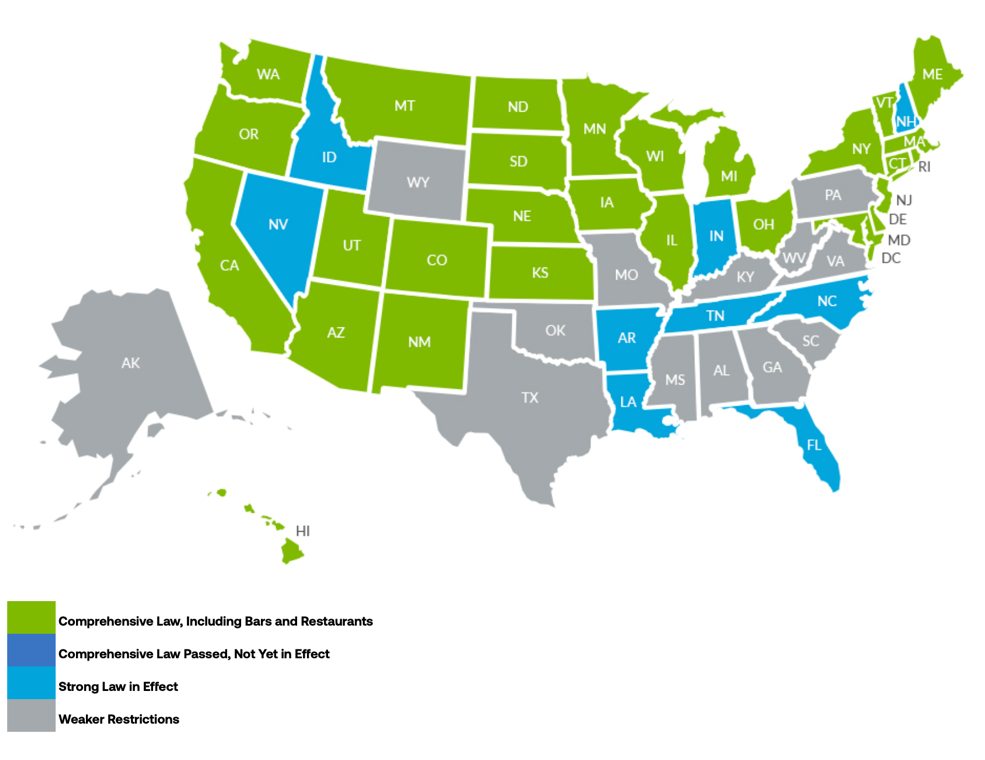These days, there are laws that are clear for the population, and their importance and usefulness are undeniable. An illustrative example of such an occasion is smoke-free legislation, which is crucial for the health of non-smokers. However, there are numerous topics, which cause multiple debates, especially concerning legislative incentives connected to them. For instance, abortion is a controversial issue, and the government frequently alter the policy in this regard. This way, the purpose of this paper is to review the aforementioned laws from the perspective of ethics and philosophy.
First of all, it is worth mentioning that I agree with smoke-free legislation. As it is seen in Figure 1, “the country has made progress toward making all 50 states smokefree with 28 states and the District of Columbia having passed comprehensive smoke free laws” (American Lung Association, n. d., para. 1). In addition, “the American Lung Association believes that all 50 states and the District of Columbia must pass laws prohibiting smoking in all public places and workplaces, including all restaurants, bars and casinos’ ‘ (American Lung Association, n. d., para. 1). Some states have also prohibited using e-cigarettes without restrictions in public places.
From the perspective of ethics, it is totally correct, as it prevents non-smokers from breathing nicotine. In addition, some pregnant women, children, and asthma patients are protected from the negative effect of passive smoking. However, citizens, who stick to such a habit, are provided with a special zone, where they are allowed to smoke. As for the philosophical point of view, people become more responsible in the context of treating others, as health is the most valuable thing, which people obtain.

The second laws regard the topic of abortion permission at the governmental level. According to Guttmacher Institute, “43 states prohibit abortions, generally except when necessary to protect the woman’s life or health, after a specified point in pregnancy” (n. d., para. 3). Therefore, a range of states accepts this procedure legal (Beber, 2017). As for the ethical side of this issue, abortion cannot be allowed, as it implies killing an innocent infant. Therefore, in case abortion is legalized, murder is legalized too, which violates the major human right (Beber, 2017). Moreover, it may appear to be harmful to a woman’s organism.
However, in the case of resorting to a philosophical perspective in this respect, it is possible to reconsider this approach. A woman is capable of making her own choice regarding her body and the infant in her stomach. Predominantly, women spend more time bringing children up, and they have to bear them, and for this reason, they should have a possibility to make their own decision. In addition, the consequences of bearing a child, who was not planned, may be more dreadful than abortion. For instance, parents may refuse a child, which is not a better option as compared to the possibility of pregnancy interruption. Therefore, a philosophical perspective is highly likely to support abortion permission.
In summary, it is evident that philosophy may offer another point of view on the issue. Although abortion prohibition responds to ethical concerns, philosophical thinking may accept such a procedure. It allows us to analyze the situation, consider all the benefits and drawbacks, and make the decision more objective. For this reason, it should be taken into consideration in case evaluating some laws, especially when they regard controversial topics.
References
An Overview of Abortion Laws. (n. d.). Guttmacher Institute. Web.
Beber, M. (2017). Abortion law and policy around the world: In search of decriminalization. Health and Human Rights, 19(1), 13-27.
Smokefree Air Laws. (n. d.). American Lung Association. Web.